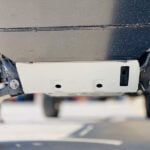Aluminum vs. Steel Skid Plates: Pros, Cons & Best Choice for Your Vehicle
Introduction: Why Skid Plates Matter for Off-Road and Daily Driving
Skid plates play a critical role in protecting your vehicle’s underbody—including the engine, transmission, and differential—from rocks, debris, and rough terrain. Whether you’re a serious off-roader or a weekend adventurer, installing the right skid plate ensures long-term durability and peace of mind.
In this article, we compare aluminum vs. steel skid plates, breaking down the pros, cons, and ideal use cases for each.
Aluminum vs. Steel Skid Plates: What’s the Difference?
Both aluminum and steel skid plates are popular among off-road enthusiasts, but they differ in key ways that impact performance, weight, durability, and cost. Let’s dive into each option.
Aluminum Skid Plates: Lightweight Performance
Pros:
Lightweight: Significantly reduces weight compared to steel, improving fuel efficiency and vehicle handling.
Corrosion-Resistant: Aluminum doesn’t rust, making it perfect for wet, muddy, or salty environments.
Easier to Install: Its lighter weight makes installation and removal easier for DIYers and mechanics alike.
Cons:
Less Durable in Heavy Impacts: Aluminum can dent or deform more easily under extreme off-road abuse.
Higher Cost: Typically more expensive than steel skid plates upfront.
Steel Skid Plates: Heavy-Duty Protection
Pros:
Extreme Durability: Ideal for harsh off-road conditions with sharp rocks, logs, and obstacles.
Affordable: Steel is often cheaper than aluminum, especially for full underbody kits.
Long Lifespan (with care): With proper maintenance and rust prevention, steel plates can last for years.
Cons:
Heavier: The added weight can slightly impact fuel economy and agility.
Prone to Rust: Requires rustproofing or coating, especially in humid or coastal areas.
Cost Comparison: Aluminum vs. Steel Skid Plates
While steel skid plates are generally more affordable upfront, aluminum skid plates may offer better long-term value due to lower maintenance and corrosion resistance.
| Material | Initial Cost | Maintenance | Longevity |
|---|---|---|---|
| Aluminum | Higher | Low | High |
| Steel | Lower | Moderate (rust prevention) | High (with upkeep) |
Protection Performance: Which Offers Better Underbody Armor?
Aluminum: Absorbs and dissipates energy, ideal for medium-duty off-roaders who want to keep weight down.
Steel: Offers a strong, rigid barrier against sharp, high-impact hazards—perfect for aggressive terrain.
💡 If you’re building an overlanding rig, aluminum might be the way to go. For rock crawling or trail abuse, steel is tough to beat.
Rust Resistance: What to Expect Long-Term
Aluminum Skid Plates: Naturally corrosion-resistant, great for wet climates or coastal regions.
Steel Skid Plates: Vulnerable to rust; must be cleaned and coated regularly (consider powder-coated or galvanized options).
Weight Considerations for Performance
Aluminum: Improves maneuverability and gas mileage.
Steel: Adds weight but maximizes strength. May slightly impact performance on lighter vehicles.
Which Should You Choose? Key Factors to Consider
Off-Road Terrain:
Mild to moderate terrain → Aluminum
Rugged, rocky terrain → Steel
Budget:
Tight budget → Steel
Long-term investment → Aluminum
Climate:
Wet/salty → Aluminum
Dry → Either, with proper care
Vehicle Weight Sensitivity:
Light SUVs or crossovers → Aluminum
Heavy-duty trucks → Either
Conclusion: Choosing the Right Skid Plate for Your Off-Road Build
The best skid plate material depends on your vehicle, terrain, and performance goals:
Choose aluminum if you want rust resistance, lightweight design, and easier handling.
Go with steel if you need maximum impact resistance and affordability.
Both materials offer great protection, and either one is far better than no underbody protection at all.
